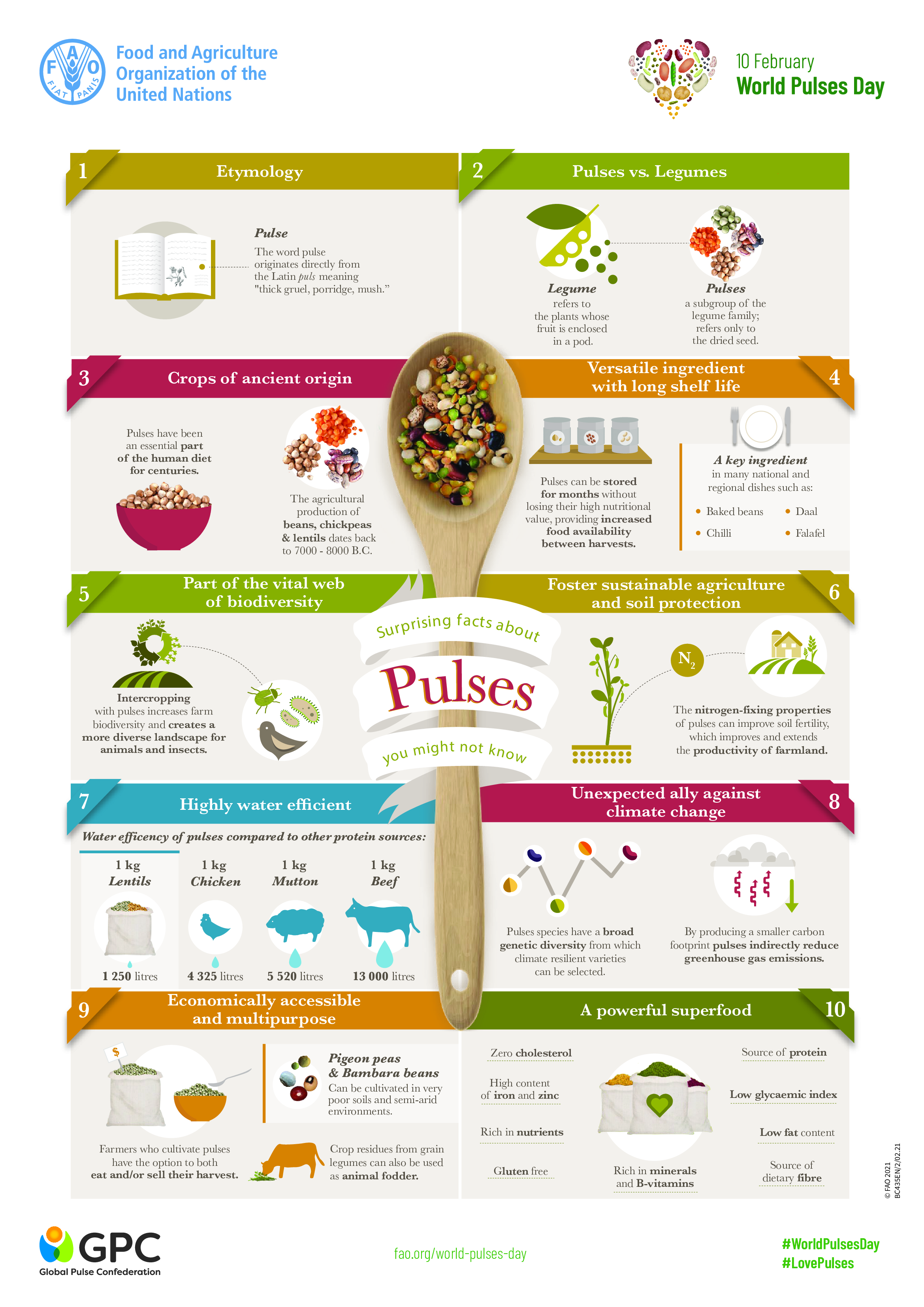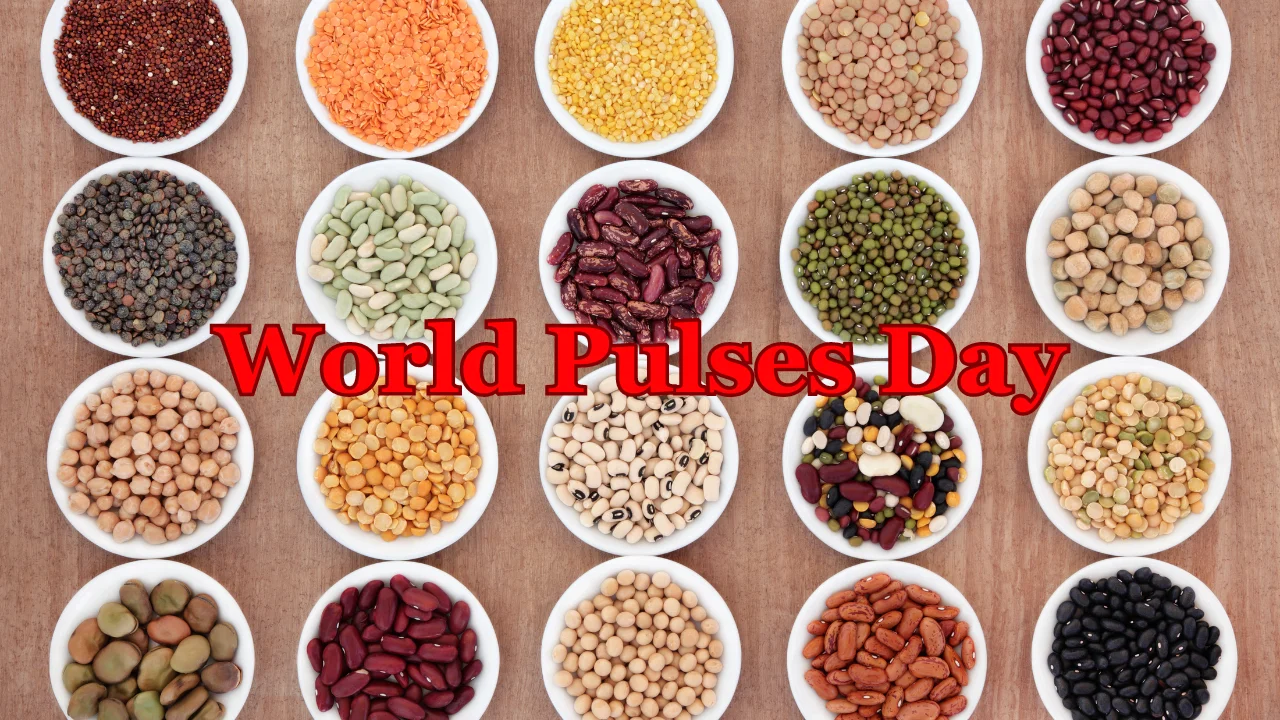World Pulses Day 2024
The World Pulses Day is celebrated annually on February 10th to recognize the importance of pulses for food security, nutrition, and sustainable agriculture.
World Pulses Day Theme 2024
The theme for World Pulses Day 2024 is “Pulses: Nourishing Soils and People”.
What are Pulses
Pulses, also known as legumes, refer to the edible seeds of leguminous plants grown for food. Commonly consumed types of pulses include dried beans, lentils, and peas.
These nutritious seeds are integral to staple dishes and cuisines worldwide. For instance, hummus, a popular dish in the Mediterranean region, is made from chickpeas. A traditional full English breakfast often includes baked navy beans, and Indian cuisine features various dal dishes made from peas or lentils.
It’s important to note that pulses exclude crops harvested green (such as green peas and green beans), which are classified as vegetable crops. Additionally, crops primarily used for oil extraction (e.g., soybeans and groundnuts) and leguminous crops exclusively used for sowing purposes (e.g., seeds of clover and alfalfa) are not considered pulses.
Why are pulses important crops
Pulses are important crops for multiple reasons, including:
Nutritional benefits:
- High protein content: Pulses are an excellent source of plant-based protein, essential for building and repairing tissues. They are particularly important in regions where meat and dairy are not readily available or economically accessible.
- Rich in fiber: Pulses are high in fiber, which helps with digestion, promotes gut health, and can help control blood sugar levels.
- Good source of vitamins and minerals: Pulses are a good source of essential vitamins and minerals, including iron, zinc, folate, and magnesium.
Sustainable agriculture:
- Nitrogen-fixing: Pulses are nitrogen-fixing crops, meaning they can convert atmospheric nitrogen into a form that plants can use. This reduces the need for synthetic fertilizers, which can be harmful to the environment.
- Improves soil health: Pulses improve soil health by adding organic matter and nitrogen to the soil. This helps to improve soil fertility and crop yields.
- Water-efficient: Pulses require less water than many other crops, making them a more sustainable option in regions with limited water resources.
Economic benefits:
- Affordable source of protein: Pulses are a relatively inexpensive source of protein, making them accessible to people of all socioeconomic backgrounds.
- Contributes to food security: By providing a reliable source of protein and other nutrients, pulses can help to improve food security and reduce hunger.
- Supports smallholder farmers: Pulses are often grown by smallholder farmers, providing them with a source of income and contributing to rural development.
Environmental benefits:
- Reduces greenhouse gas emissions: Pulses have a lower carbon footprint than many other protein sources, such as meat and dairy.
- Promotes biodiversity: Pulses can be grown in rotation with other crops, which helps to promote biodiversity and soil health.
- Adaptable to climate change: Pulses are able to tolerate a wide range of climatic conditions. It makes them a more resilient crop in the face of climate change.
Overall, pulses are important crops for a variety of reasons. They provide essential nutrients, promote sustainable agriculture, contribute to food security, and have a positive impact on the environment.
Surprising Facts about Pulses

History of World Pulses Day
World Pulses Day, observed on 10 February, has its roots in the International Year of Pulses (IYP) in 2016. The United Nations General Assembly adopted a resolution on 20 December 2013, declaring 2016 as the IYP. Led by the Food and Agriculture Organization of the United Nations (FAO), the IYP aimed to enhance public awareness of the nutritional and environmental benefits of pulses in sustainable food production.
Due to the success of the IYP and the recognition of pulses’ potential in achieving the 2030 Agenda for Sustainable Development, Burkina Faso proposed the observance of World Pulses Day. In 2019, the UN General Assembly officially proclaimed 10 February as World Pulses Day. The day emphasizes the importance of pulses in addressing various Sustainable Development Goals, including goals related to poverty reduction, food security, health, gender equality, and environmental sustainability.
Significance of World Pulses Day
World Pulses Day, celebrated on February 10th annually, holds great significance for several reasons:
- Pulses are often overlooked despite their remarkable nutritional profile, rich in protein, fiber, vitamins, and minerals. World Pulses Day brings awareness to their importance in promoting healthy diets and combating malnutrition.
- Pulses play a crucial role in sustainable agriculture practices. Their nitrogen-fixing ability and water efficiency contribute to soil health and environmental sustainability.
- Pulses offer a reliable and affordable source of protein, especially in regions facing food insecurity. World Pulses Day emphasizes their potential to address hunger and malnutrition.
- Pulses contribute significantly to the agricultural economy, supporting farmers and rural communities. The day highlights their economic importance and promotes their cultivation and consumption.
- The day promotes further research and development related to pulse production, processing, and utilization, leading to improved varieties, increased yields, and better nutritional profiles.
- Pulses are deeply embedded in cultural traditions and cuisines worldwide. World Pulses Day celebrates this diversity and encourages exploring new flavors and culinary experiences.
- By highlighting the variety of pulse crops, the day encourages the preservation of agricultural biodiversity and traditional farming practices.
World Pulses Day serves as a crucial reminder of the valuable role pulses play in our lives. By raising awareness, promoting action, and celebrating diversity, the day inspires us to contribute to a more sustainable, food-secure, and healthier future.
10th February 2024 Special Day
On the 10th of February 2024, the world comes together to celebrate World Pulses Day, an annual occasion dedicated to acknowledging the vital role of pulses in ensuring food security, promoting nutrition, and fostering sustainable agriculture practices. This day highlights the significance of pulses, such as lentils and beans, in enhancing global food systems. It also underscores their contribution to building healthier and more resilient communities worldwide.
- RRB ALP Vs RRB JE, Which is Better Job?
- Central Bank of India Apprentice Exam Date 2025 Out
- SSC CHSL English Syllabus 2025, Check Detailed Syllabus
- SSC GD Constable Exam News & Next Notification Update
- SBI PO Handwritten Declaration 2025, Format, Image Size
- Biology MCQs for SSC CGL, Get Solved Questions with Answers

Hello, I’m Aditi, the creative mind behind the words at Oliveboard. As a content writer specializing in state-level exams, my mission is to unravel the complexities of exam information, ensuring aspiring candidates find clarity and confidence. Having walked the path of an aspirant myself, I bring a unique perspective to my work, crafting accessible content on Exam Notifications, Admit Cards, and Results.
At Oliveboard, I play a crucial role in empowering candidates throughout their exam journey. My dedication lies in making the seemingly daunting process not only understandable but also rewarding. Join me as I break down barriers in exam preparation, providing timely insights and valuable resources. Let’s navigate the path to success together, one well-informed step at a time.






